- Home
- Brand, Max
Way of the Lawless Page 12
Way of the Lawless Read online
Page 12
The marshal admitted that he never had. "But you're a rare man," he said.
Pop shook his head. "When I was a boy like you," he said, "I wasn't nothin' to be passed up too quick. But a man's young only once, and that's a short time—and he's old for years and years and years, Dozier." He added, for fear that he might have depressed his guest, "But me and Jud team it, you see. I'm extra old and Jud's extra young—so we kind of hit an average."
He touched the shoulder of the boy and there was a flash of eyes between them, the flicker of a smile. Hal Dozier drew a breath. "I got no kids of my own," he declared. "You're lucky, friend. And you're lucky to have this neat little house."
"No, I ain't. They's no luck to it, because I made every sliver of it with my own hands." An idea came to the deputy marshal.
"There's a place up in the hills behind my house, a day's ride," he said, "where I go hunting now and then, and I've an idea a little house like this would be just the thing for me. Mind if I look it over?"
Pop tamped his pipe.
"Sure thing," he said. "Look as much as you like."
He stepped to a corner of the room and by a ring he raised a trapdoor. "I got a cellar 'n' everything. Take a look at it below."
He lighted the lantern, and Hal Dozier went down the steep steps, humming. "Look at the way that foundation's put in," said the old man in a loud voice. "I done all that, too, with my own hands."
His voice was so unnecessarily loud, indeed, just as if the deputy were already under ground, that it occurred to Dozier that if a man were lying in that cellar he would be amply warned. And going down he walked with the lantern held to one side, to keep the light off his own body as much as possible; his hand kept at his hip.
But, when he reached the cellar, he found only some boxes and canned provisions in a rack at one side, and a various litter all kept in close order. Big stones had been chiseled roughly into shape to build the walls, and the flooring was as dry as the floor of the house. It was, on the whole, a very solid bit of work. A good place to imprison a man, for instance. At this thought Dozier glanced up sharply and saw the other holding the trapdoor ajar. Something about that implacable, bony face made Dozier turn and hurry back up the stairs to the main floor of the house.
"Nice bit of work down there," he said. "I can use that idea very well. Well," he added carelessly, "I wonder when my fool posse will get through hunting for the remains of poor Lanning? Come to think of it"—for it occurred to him that if the old man were indeed concealing the outlaw he might not know the price which was on his head—"there's a pretty little bit of coin connected with Lanning. Too bad you didn't drop him when he came to your door."
"Drop a helpless man—for money?" asked the old man. "Never, Dozier!"
"He hadn't long to live, anyway," answered the marshal in some confusion. Those old, straight eyes of Pop troubled him.
He fenced with a new stroke for a confession.
"For my part, I've never had much heart in this work of mine."
"He killed your brother, didn't he?" asked Pop with considerable dryness.
"Bill made the wrong move," replied Hal instantly. "He never should have ridden Lanning down in the first place. Should have let the fool kid go until he found out that Buck Heath wasn't killed. Then he would have come back of his own accord."
"That's a good idea," remarked the other, "but sort of late, it strikes me. Did you tell that to the sheriff?"
"Late it is," remarked Dozier, not following the question. "Now the poor kid is outlawed. Well, between you and me, I wish he'd gotten away clean-handed. But too late now.
"By the way," he went on, "I'd like to take a squint at your attic, too. That ladder goes up to it, I guess."
"Go ahead," said Pop. And once more he tamped his pipe.
There was a sharp, shrill cry from the boy, and Dozier whirled on him. He saw a pale, scared face.
"What's the matter?" he asked sharply. "What's the matter with you, Jud?" And he fastened his keen glance on the boy.
Vaguely, from the corner of his eye, he felt that Pop had taken the pipe from his mouth. There was a sort of breathless touch in the air of the room. "Nothin'," said Jud. "Only—you know the rungs of that ladder ain't fit to be walked on, grandad!"
"Jud," said the old man with a strained tone, "It ain't my business to give warnin's to an officer of the law—not mine. He'll find out little things like that for himself."
For one moment Dozier remained looking from one face to the other. Then he shrugged his shoulders and went slowly up the ladder. It squeaked under his weight, he felt the rungs bow and tremble. Halfway up he turned suddenly, but Pop was sitting as old men will, humming a tune and keeping time to it by patting the bowl of his pipe with a forefinger.
And Dozier made up his mind.
He turned and came down the ladder. "I guess there's no use looking in the attic," he said. "Same as any other attic, I suppose, Pop?"
"The same?" asked Pop, taking the pipe from his mouth. "I should tell a man it ain't. It's my work, that attic is, and it's different. I handled the joinin' of them joists pretty slick, but you better go and see for yourself."
And he smiled at the deputy from under his bushy brows. Hal Dozier grinned broadly back at him.
"I've seen your work in the cellar, Pop," he said. "I don't want to risk my neck on that ladder. No, I'll have to let it go. Besides, I'll have to round up the boys."
He waved farewell, stepped through the door, and closed it behind him.
"Grandad," exclaimed Jud in a gasp.
The old man silenced him with a raised finger and a sudden frown. He slipped to the door in turn with a step so noiseless that even Jud wondered. Years seemed to have fallen from the shoulders of his grandfather. He opened the door quickly, and there stood the deputy. His back, to be sure, was turned to the door, but he hadn't moved.
"Think I see your gang over yonder," said Pop. "They seem to be sort of waitin' for you, Dozier."
The other turned and twisted one glance up at the old man.
"Thanks," he said shortly and strode away.
Pop closed the door and sank into a chair. He seemed suddenly to have aged again.
"Oh, grandad," said Jud, "how'd you guess he was there all the time?"
"I dunno," said Pop. "Don't bother me."
"But why'd you beg him to look into the attic? Didn't you know he'd see him right off?"
"Because he goes by contraries, Jud. He wouldn't of started for the ladder at all, if you hadn't told him he'd probably break his neck on it. Only when he seen I didn't care, he made up his mind he didn't want to see that attic."
"And if he'd gone up?" whispered Jud.
"Don't ask me what would of happened," said Pop.
All his bony frame was shaken by a shiver.
"Is he such a fine fighter?" asked Jud.
"Fighter?" echoed Pop. "Oh, lad, he's the greatest hand with a gun that ever shoved foot into stirrup. He—he was like a bulldog on a trail—and all I had for a rope to hold him was just a little spider thread of thinking. Gimme some coffee, Jud. I've done a day's work."
* * *
CHAPTER 27
The bullets of the posse had neither torn a tendon nor broken a bone. Striking at close range and driven by highpower rifles, the slugs had whipped cleanly through the flesh of Andrew Lanning, and the flesh closed again, almost as swiftly as ice freezes firm behind the wire that cuts it. In a very few days he could sit up, and finally came down the ladder with Pop beneath him and Jud steadying his shoulders from above. That was a gala day in the house. Indeed, they had lived well ever since the coming of Andrew, for he had insisted that he bear the household expense while he remained there, since they would not allow him to depart.
"And I'll let you pay for things, Andrew," Pop had said, "if you won't say nothing about it, ever, to Jud. He's a proud kid, is Jud, and he'd bust his heart if he thought I was lettin' you spend a cent here."
But this day they had a fine steak, b
rought out from Tomo by Pop the evening before, and they had beans with plenty of pork and molasses in them, cream biscuits, which Pop could make delicious beyond belief, to say nothing of canned tomatoes with bits of dried bread in them, and coffee as black as night. Such was the celebration when Andrew came down to join his hosts, and so high did all spirits rise that even Jud, the resolute and the alert, forgot his watch. Every day from dawn to dark he was up to the door or to the rear window, keeping the landscape under a sweeping observance every few moments, lest some chance traveler—all search for Andrew Lanning had, of course, ceased with the moment of his disappearance—should happen by and see the stranger in the household of Pop. But during these festivities all else was forgotten, and in the midst of things a decided, rapid knock was heard at the door.
Speech was cut off at the root by that sound. For whoever the stranger might be, he must certainly have heard three voices raised in that room. It was Andrew who spoke. And he spoke in only a whisper. "Whoever it may be, let him in," said Andrew, "and, if there's any danger about him, he won't leave till I'm able to leave. Open the door, Jud."
And Jud, with a stricken look, crossed the floor with trailing feet. The knock was repeated; it had a metallic clang, as though the man outside were rapping with the butt of a gun in his impatience, and Andrew, setting his teeth, laid his hand on the handle of his revolver. Here Jud cast open the door, and, standing close to it with her forefeet on the top step, was the bay mare. She instantly thrust in her head and snorted in the direction of the stranger.
"Thank heaven!" said Andrew. "I thought it was the guns again!" And Jud, shouting with delight and relief, threw his arms around the neck of the horse. "It's Sally!" he said. "Sally, you rascal!"
"That good-for-nothing hoss Sally," complained the old man. "Shoo her away, Jud."
But Andrew protested at that, and Jud cast him a glance of gratitude. Andrew himself got up from the table and went across the room with half of an apple in his hand. He sliced it into bits, and she took them daintily from between his fingers. And when Jud reluctantly ordered her away she did not blunder down the steps, but threw her weight back on her haunches and swerved lightly away. It fascinated Andrew; he had never seen so much of feline control in the muscles of a horse. When he turned back to the table he announced: "Pop, I've got to ride that horse. I've got to have her. How does she sell?"
"She ain't mine," said Pop. "You better ask Jud."
Jud was at once white and red. He looked at his hero, and then he looked into his mind and saw the picture of Sally. A way out occurred to him. "You can have her when you can ride her," he said. "She ain't much use except to look at. But if you can saddle her and ride her before you leave—well, you can leave on her, Andy."
It was the beginning of busy days for Andrew. The cold weather was coming on rapidly. Now the higher mountains above them were swiftly whitening, while the line of the snow was creeping nearer and nearer. The sight of it alarmed Andrew, and, with the thought of being snow-bound in these hills, his blood turned cold. What he yearned for were the open spaces of the mountain desert, where he could see the enemy approach. But every day in the cabin the terror grew that someone would pass, some one, unnoticed, would observe the stranger. The whisper would reach Tomo—the posse would come again, and the second time the trap was sure to work. He must get away, but no ordinary horse would do for him. If he had had a fine animal under him Bill Dozier would never have run him down, and he would still be within the border of the law. A fine horse—such a horse as Sally, say!
If he had been strong he would have attempted to break her at once, but he was not strong. He could barely support his own weight during the first couple of days after he left the bunk, and he had to use his mind. He began, then, at the point where Jud had left off.
Jud could ride Sally with a scrap of cloth beneath him; Andrew started to increase the size of that cloth. To keep it in place he made a long strip of sacking to serve as a cinch, and before the first day was gone she was thoroughly used to it. With this great step accomplished, Andrew increased the burden each time he changed the pad. He got a big tarpaulin and folded it many times; the third day she was accepting it calmly and had ceased to turn her head and nose it. Then he carried up a small sack of flour and put that in place upon the tarpaulin. She winced under the dead-weight burden; there followed a full half hour of frantic bucking which would have pitched the best rider in the world out of a saddle, but the sack of flour was tied on, and Sally could not dislodge it. When she was tired of bucking she stood still, and then discovered that the sack of flour was not only harmless but that it was good to eat. Andrew was barely in time to save the contents of the sack from her teeth.
It was another long step forward in the education of Sally. Next he fashioned clumsy imitations of stirrups, and there was a long fight between Sally and stirrups, but the stirrups, being inanimate, won, and Sally submitted to the bouncing wooden things at her sides. And still, day after day, Andrew built his imitation saddle closer and closer to the real thing, until he had taken a real pair of cinches off one of Pop's saddles and had taught her to stand the pressure without flinching.
There was another great return from Andrew's long and steady intimacy with the mare. She came to accept him absolutely. She knew his voice; she would come to his whistle; and finally, when every vestige of unsoundness had left his wounds, he climbed into that improvised saddle and put his feet in the stirrups. Sally winced down in her catlike way and shuddered, but he began to talk to her, and the familiar voice decided Sally. She merely turned her head and rubbed his knee with her nose. The battle was over and won. Ten minutes later Andrew had cinched a real saddle in place, and she bore the weight of the leather without a stir. The memory of that first saddle and the biting of the bur beneath it had been gradually wiped from her mind, and the new saddle was connected indisolubly with the voice and the hand of the man. At the end of that day's work Andrew carried the saddle back into the house with a happy heart.
And the next day he took his first real ride on the back of the mare. He noted how easily she answered the play of his wrist, how little her head moved in and out, so that he seldom had to sift the reins through his fingers to keep in touch with the bit. He could start her from a stand into a full gallop with a touch of his knees, and he could bring her to a sliding halt with the least pressure on the reins. He could tell, indeed, that she was one of those rare possessions, a horse with a wise mouth.
And yet he had small occasion to keep up on the bit as he rode her. She was no colt which hardly knew its own paces. She was a stanch five-year-old, and she had roamed the mountains about Pop's place at will. She went like a wild thing over the broken going. That catlike agility with which she wound among the rocks, hardly impaired her speed as she swerved. Andrew found her a book whose pages he could turn forever and always find something new.
He forgot where he was going. He only knew that the wind was clipping his face and that Sally was eating up the ground, and he came to himself with a start, after a moment, realizing that his dream had carried him perilously out of the mouth of the ravine. He had even allowed the mare to reach a bit of winding road, rough indeed, but cut by many wheels and making a white streak across the country. Andrew drew in his breath anxiously and turned her back for the cañon.
* * *
CHAPTER 28
It was, indeed, a grave moment, yet the chances were large that even if he met someone on the road he would not be recognized, for it had been many days since the death of Andrew Lanning was announced through the countryside. He gritted his teeth when he thought that this single burst of childish carelessness might have imperiled all that he and Jud and Pop had worked for so long and so earnestly—the time when he could take the bay mare and start the ride across the mountains to the comparative safety on the other side.
That time, he made up his mind, would be the next evening. He was well; Sally was thoroughly mastered; and, with a horse beneath him which, he felt
, could give even the gray stallion of Hal Dozier hard work, and therefore show her heels to any other animal on the mountain desert, he looked forward to the crossing of the mountains as an accomplished fact. Always supposing that he could pass Twin Falls and the fringe of towns in the hills, without being recognized and the alarm sent out.
Going back up the road toward the ravine at a brisk canter, he pursued the illuminating comparison between Sally and Dozier's famous Gray Peter. Of course, nothing but a downright test of speed and weight-carrying power, horse to horse, could decide which was the superior, but Andrew had ridden Gray Peter many times when he and Uncle Jasper went out to the Dozier place, and he felt that he could sum up the differences between the two beautiful animals. Sally was the smaller of the two, for instance. She could not stand more than fifteen hands, or fifteen-one at the most. Gray Peter was a full sixteen hands of strong bone and fine muscle, a big animal—almost too big for some purposes. Among these rocks, now, he would stand no chance with Sally. Gray Peter was a picture horse. When one looked at him one felt that he was a standard by which other animals should be measured. He carried his head loftily, and there was a lordly flaunt to his tail. On the other hand, Sally was rather long and low. Furthermore, her neck, which was by no means the heavy neck of the gray stallion, she was apt to carry stretched rather straight out and not curled proudly up as Gray Peter carried his. Neither did she bear her tail so proudly. Some of this, of course, was due to the difference between a mare and a stallion, but still more came from the differing natures of the two animals. In the head lay the greatest variation. The head of Gray Peter was close to perfection, light, compact, heavy of jowl; his eye at all times was filled with an intolerable brightness, a keen flame of courage and eagerness. But one could find a fault with Sally's head. In general, it was very well shaped, with the wide forehead and all the other good points which invariably go with that feature; but her face was just a trifle dished. Moreover, her eye was apt to be a bit dull. She had been a pet all her life, and, like most pets, her eye partook of the human quality. It had a conversational way of brightening and growing dull. On the whole, the head of Sally had a whimsical, inquisitive expression, and by her whole carriage she seemed to be perpetually putting her nose into other business than her own.

 Alcatraz
Alcatraz the Long, Long Trail (1923)
the Long, Long Trail (1923)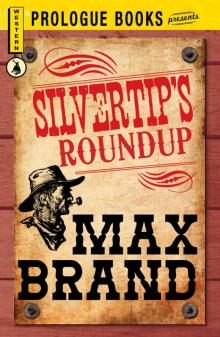 Silvertip's Roundup
Silvertip's Roundup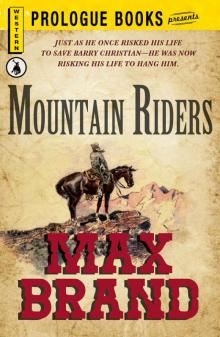 Mountain Riders
Mountain Riders Silvertip (1942)
Silvertip (1942)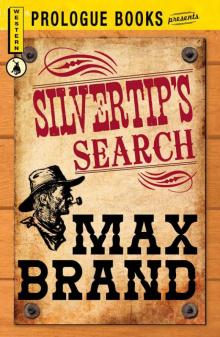 Silvertip's Search
Silvertip's Search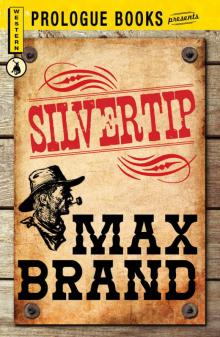 Silvertip
Silvertip Bull Hunter
Bull Hunter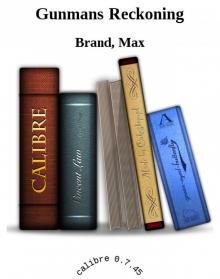 Gunmans Reckoning
Gunmans Reckoning The Seventh Man
The Seventh Man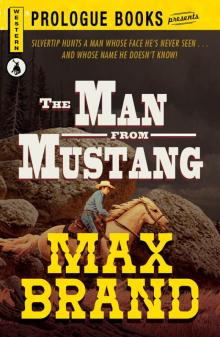 Man From Mustang
Man From Mustang Riders of the Silences
Riders of the Silences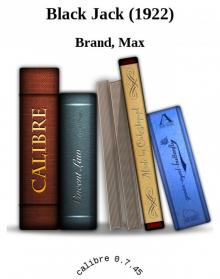 Black Jack (1922)
Black Jack (1922) Way of the Lawless
Way of the Lawless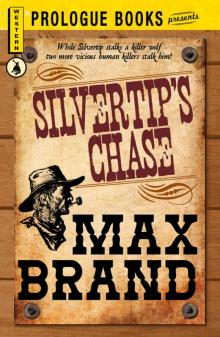 Silvertip's Chase
Silvertip's Chase Trailin
Trailin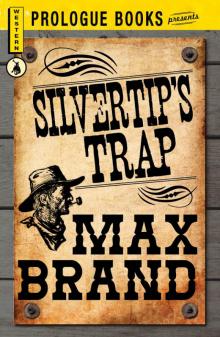 Silvertip's Trap
Silvertip's Trap Ronicky Doone (1921)
Ronicky Doone (1921) The Night Horseman
The Night Horseman the Garden Of Eden (1963)
the Garden Of Eden (1963)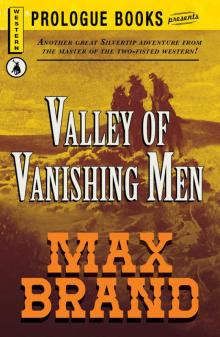 Valley of the Vanishing Men
Valley of the Vanishing Men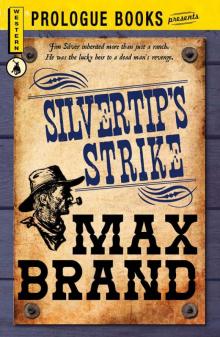 Silvertip's Strike
Silvertip's Strike Black Jack
Black Jack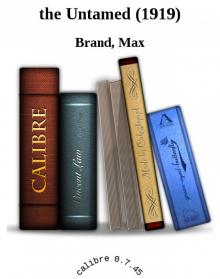 the Untamed (1919)
the Untamed (1919) Way Of the Lawless (1921)
Way Of the Lawless (1921) The Untamed
The Untamed